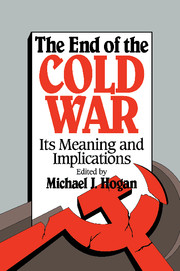Book contents
- Frontmatter
- Contents
- Preface
- The Authors
- Dedication
- 1 Introduction
- 2 An End to Which Cold War?
- 3 The Cold War, the Long Peace, and the Future
- 4 Quiet Cataclysm: Some Afterthoughts on World War III
- 5 Some Lessons from the Cold War
- 6 Nuclear Weapons and European Security during the Cold War
- 7 Victory in the Postwar Era: Despite the Cold War or Because of It?
- 8 The Wicked Witch of the West is Dead. Long Live the Wicked Witch of the East
- 9 The End and the Begining
- 10 A Balance Sheet: Lippmann, Kennan, and the Cold War
- 11 Why Did the Cold War Arise, and Why Did It End?
- 12 A View from Below
- 13 The End of the Cold War and the Middle East
- 14 The End of the Cold War in the Near East: What It Means for Historians and Policy Planners
- 15 After the Cold War: The United States, Germany, and European Security
- 16 The End of the Cold War: A Skeptical View
- 17 The End of the Cold War, the New Role for Europe, and the Decline of the United States
- 18 The Fading of the Cold War—and the Demystification of Twentieth-Century Issues
- 19 The U.S. Government, a Legacy of the Cold War
- 20 Foreign Policy, Partisan Politics, and the End of the Cold War
- 21 Beyond Bipolarity in Space and Time
- 22 A Usable Past for the Future
- Selective Bibliography
- Index
21 - Beyond Bipolarity in Space and Time
Published online by Cambridge University Press: 18 December 2009
- Frontmatter
- Contents
- Preface
- The Authors
- Dedication
- 1 Introduction
- 2 An End to Which Cold War?
- 3 The Cold War, the Long Peace, and the Future
- 4 Quiet Cataclysm: Some Afterthoughts on World War III
- 5 Some Lessons from the Cold War
- 6 Nuclear Weapons and European Security during the Cold War
- 7 Victory in the Postwar Era: Despite the Cold War or Because of It?
- 8 The Wicked Witch of the West is Dead. Long Live the Wicked Witch of the East
- 9 The End and the Begining
- 10 A Balance Sheet: Lippmann, Kennan, and the Cold War
- 11 Why Did the Cold War Arise, and Why Did It End?
- 12 A View from Below
- 13 The End of the Cold War and the Middle East
- 14 The End of the Cold War in the Near East: What It Means for Historians and Policy Planners
- 15 After the Cold War: The United States, Germany, and European Security
- 16 The End of the Cold War: A Skeptical View
- 17 The End of the Cold War, the New Role for Europe, and the Decline of the United States
- 18 The Fading of the Cold War—and the Demystification of Twentieth-Century Issues
- 19 The U.S. Government, a Legacy of the Cold War
- 20 Foreign Policy, Partisan Politics, and the End of the Cold War
- 21 Beyond Bipolarity in Space and Time
- 22 A Usable Past for the Future
- Selective Bibliography
- Index
Summary
In November 1990, George Bush made it official. “The Cold War is over,” the president proclaimed in Paris, finally echoing what had been Mikhail Gorbachev's refrain for more than a year. From a historical perspective, one might question the now-pervasive use of the term “Cold War” to embrace the whole post-1945 era. It is perhaps more correct to talk about alternating phases of Cold War and detente within an overall Soviet-American antagonism—hence, for instance, the growing use of the term “the First Cold War” to refer to the period from roughly 1947 to 1953.
Despite these caveats, it seems reasonable to claim that what might be labeled “the era of Cold Wars” has come to an end. Unlike previous phases of detente, such as the early 1970s, there has of late been a fundamental shift in the structure of international relations. Particularly notable has been the dismantling of the Soviet bloc in Eastern Europe, the collapse of communism in this area, and the demise of the Soviet Union. These are changes that would require nothing less than another war to reverse. At the same time, the unification of Germany has redrawn the map of Europe and clearly marks the end of an era. The reemergence of Germany suggests immediately one probable consequence of the new international situation for our understanding of the history of American foreign policy. The impetus toward “depolarization” of the origins of the Cold War will surely be intensified.
- Type
- Chapter
- Information
- The End of the Cold WarIts Meaning and Implications, pp. 245 - 256Publisher: Cambridge University PressPrint publication year: 1992
- 2
- Cited by



